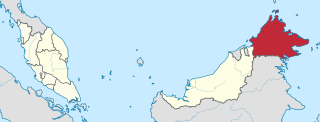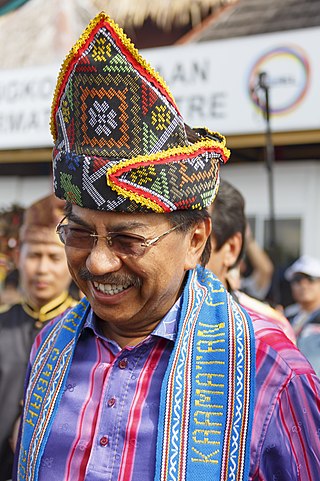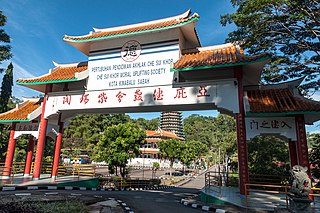Related Research Articles

Sabah is a state of Malaysia located on the northern portion of Borneo, in the region of East Malaysia. Sabah has land borders with the Malaysian state of Sarawak to the southwest and Indonesia's North Kalimantan province to the south. The Federal Territory of Labuan is an island just off Sabah's west coast. Sabah shares maritime borders with Vietnam to the west and the Philippines to the north and east. Kota Kinabalu is the state capital and the economic centre of the state, and the seat of the Sabah State government. Other major towns in Sabah include Sandakan and Tawau. The 2020 census recorded a population of 3,418,785 in the state. It has an equatorial climate with tropical rainforests, abundant with animal and plant species. The state has long mountain ranges on the west side which forms part of the Crocker Range National Park. Kinabatangan River, the second longest river in Malaysia runs through Sabah. The highest point of Sabah, Mount Kinabalu is also the highest point of Malaysia.

Kota Kinabalu, colloquially referred to as KK, is the state capital of Sabah, Malaysia. It is also the capital of the Kota Kinabalu District as well as the West Coast Division of Sabah. The city is located on the northwest coast of Borneo facing the South China Sea. The Tunku Abdul Rahman National Park lies to its west and Mount Kinabalu, which gave the city its name, is located to its east. Kota Kinabalu has a population of 452,058 according to the 2010 census; when the adjacent Penampang and Tuaran districts are included, the metro area has a combined population of 628,725. The 2020 Census revealed an increase in the municipal population to 500,421, while the wider area including the Penampang and Putatan districts had a population of 731,406.

Kudat is the capital of the Kudat District in the Kudat Division of Sabah, Malaysia. Its population was estimated to be around 29,025 in 2010. It is located on the Kudat Peninsula, about 190 kilometres (120 mi) north of Kota Kinabalu, the state capital, and is near the northernmost point of Borneo. It is the largest town in the heartland of the Rungus people which is a sub-ethnic group of the majority Kadazan-Dusun race and is therefore a major centre of Rungus culture. It is also notable for being one of the first parts of Sabah to be settled by Chinese Malaysians, particularly from the Hakka dialect group. It is the Northernmost Malaysian city.

Kota Kinabalu International Airport (KKIA) is an international airport in Kota Kinabalu, the state capital of Sabah, Malaysia. It is located approximately 8 km (5.0 mi) southwest of the city centre. In 2019, over 9 million passengers passed through the airport, making it the second busiest airport in Malaysia after Kuala Lumpur International Airport in terms of passenger movements & aircraft movements and the third busiest in terms of cargo handled.

Sabah State Railway is a railway system and operator in the state of Sabah in Malaysia. It is the only rail transport system operating on the island of Borneo. The railway consists of a single 134-kilometre line from Tanjung Aru, Kota Kinabalu in West Coast Division to the town of Tenom, in the Interior Division. It was formerly known as North Borneo Railway.

The Kota Kinabalu City Hall is the city council which administers the city and district of Kota Kinabalu in the state of Sabah, Malaysia. The council consists of the mayor plus twenty-four councillors appointed to serve a one-year term by the Sabah State Government.

Musa Bin Haji Aman is a Malaysian politician who served as the 14th Chief Minister, State Minister of Finance from March 2003 to May 2018, Member of the Sabah State Legislative Assembly (MLA) for Sungai Sibuga from February 1994 to September 2020, the former State Chairman of Barisan Nasional (BN) and United Malays National Organisation (UMNO) of Sabah. In April 2023, He become the direct member of Gabungan Rakyat Sabah (GRS). He is the longest-serving Chief Minister of Sabah by holding the position for 15 years and is the older half brother of Anifah Aman, the Special Advisor to the Chief Minister of Sabah on International Relations and Foreign Investments, President of Love Sabah Party (PCS) and former Minister of Foreign Affairs.
Tanjung Aru is a sub-district of Kota Kinabalu in Sabah, of Malaysia. Its main feature is its beach called Tanjung Aru Beach which stretches to over 2 kilometres long along with new skyscrapers. This beach has a lot of Casuarina equisetifolia trees (aru) there naming this town.

La Salle Secondary School, Kota Kinabalu is a co-educational secondary school for boys and girls and one of the oldest schools in Kota Kinabalu on the coast of Borneo in East Malaysia.

Greater Kota Kinabalu refers to the dense clusters of regional populated areas surrounding the city of Kota Kinabalu in Malaysia. It comprises the districts of Kota Kinabalu, Penampang, Tuaran and Papar. These districts are also part of the West Coast Division. It was forecasted that in 2019, the combined population of these districts was 1.1 million people, in a combined area of 3,277 km2.

Kota Kinabalu High School, KKHS is a high school in Kota Kinabalu, Sabah, Malaysia.
The Kota Kinabalu Line is a proposed light rapid transit (LRT) system network in Kota Kinabalu, Malaysia, as one of the method to ease traffic congestion in the city. The proposal has been considered, and as reported in the government website, the project was in the ground breaking process under the Kota Kinabalu development plan. The current under construction project of the Aeropod rail station in Tanjung Aru also has made a provision for LRT in their plan.
The BRT Kota Kinabalu is a bus rapid transit (BRT) project to improve bus services in the city of Kota Kinabalu. An allocation of around MYR1 billion has been provided by the Malaysian government under the 2016 Malaysian Budget to implement the project. Currently, the project is under studies between the federal and state governments and it was predicted to be finished in 2020. It has also been lauded by the Prasarana Malaysia, the government-owned company specialise in bus and light metro development, the Chief Minister of Sabah, Musa Aman and various other politicians who said they have been waited for almost 10 years.

The Aeropod is a mixed development projects comprising hotel, a retail mall, retail offices, residential suites, corporate offices and green parks in Tanjung Aru, Kota Kinabalu, Sabah, Malaysia. The projects are being done in five stages. The projects also include a provision for light rail transit (LRT) in the Kota Kinabalu metropolitan, to improve the already available rail station in Tanjung Aru.

Che Sui Khor Moral Uplifting Society is a Dejiao establishment located in Kota Kinabalu, Sabah, Malaysia. The centre has been opened since 1981.

Perdana Park is a recreational park in Tanjung Aru, Kota Kinabalu, Sabah, Malaysia.

Tanjung Aru railway station is one of four main railway station on the Western Sabah Railway Line located in Tanjung Aru, Kota Kinabalu, Sabah, Malaysia.
The Western Sabah Railway Line in Sabah, Malaysia is the name given to rail services that operate from Tanjung Aru until Tenom in the West Coast and Interior divisions under the management of Sabah State Railway. The line previously known as North Borneo Railway Line.

Tanjung Aru Library is a public library in the Greater Kota Kinabalu area of Tanjung Aru, Sabah, Malaysia. It's also the first "Green" library in Malaysia.
Sabah Hakka Complex is a five-storey building complex with an event hall located at 26, Signal Hill Road, Tanjung Lipat, Likas of Kota Kinabalu, Sabah, Malaysia. The complex is built as a recognition from the Sabah government to local Hakka Chinese contribution to the economy of Sabah since their early migration with the main building structure is designed after the world-famous traditional Hakka houses in Fujian of China, the Tulao.
References
- 1 2 "Chief Minister of Sabah, YAB Datuk Seri Panglima Musa Haji Aman's Speech at the Launch of the Tanjung Aru Eco Development Project at Prince Phillip Park, Tanjung Aru". Government of Sabah. 16 September 2013. Archived from the original on 23 April 2017. Retrieved 23 April 2017.
- 1 2 Stephanie Lee (5 December 2016). "Tanjung Aru reclamation works to begin in April 2017". The Star. Retrieved 23 April 2017.
- 1 2 3 Julia Chan (3 September 2014). "RM7.1b Sabah beachfront development plan draws conservationists' ire". The Malay Mail. Retrieved 23 April 2017.
- 1 2 "City & Country: Tanjung Aru Eco Development to rehabilitate public spaces and attract investment". The Edge Property. 8 April 2015. Archived from the original on 23 April 2017. Retrieved 23 April 2017.
- 1 2 Ruben Sario (30 June 2016). "Tanjung Aru project to go ahead". The Star. Retrieved 23 April 2017.
- ↑ Jenne Lajiun (2 November 2016). "Tanjung Aru Eco Development master plan submitted to City Hall". The Borneo Post. Retrieved 23 April 2017.
- ↑ "Report on Tg Aru Eco Development Open for Public Feedback". The Borneo Post. Property Hunter. 31 October 2016. Retrieved 23 April 2017.
- ↑ Jason Santos (13 April 2017). "Govt told not to delay on Tanjung Aru Eco project". Daily Express. Archived from the original on 23 April 2017. Retrieved 23 April 2017.
- ↑ Olivia Miwil (8 January 2017). "KK mayor flays critics of TAED, hails project as game changer". New Straits Times. Retrieved 23 April 2017.
- ↑ "World's best consultants hired for Tanjung Aru project". Daily Express. 8 April 2017. Archived from the original on 15 April 2017. Retrieved 25 April 2017.